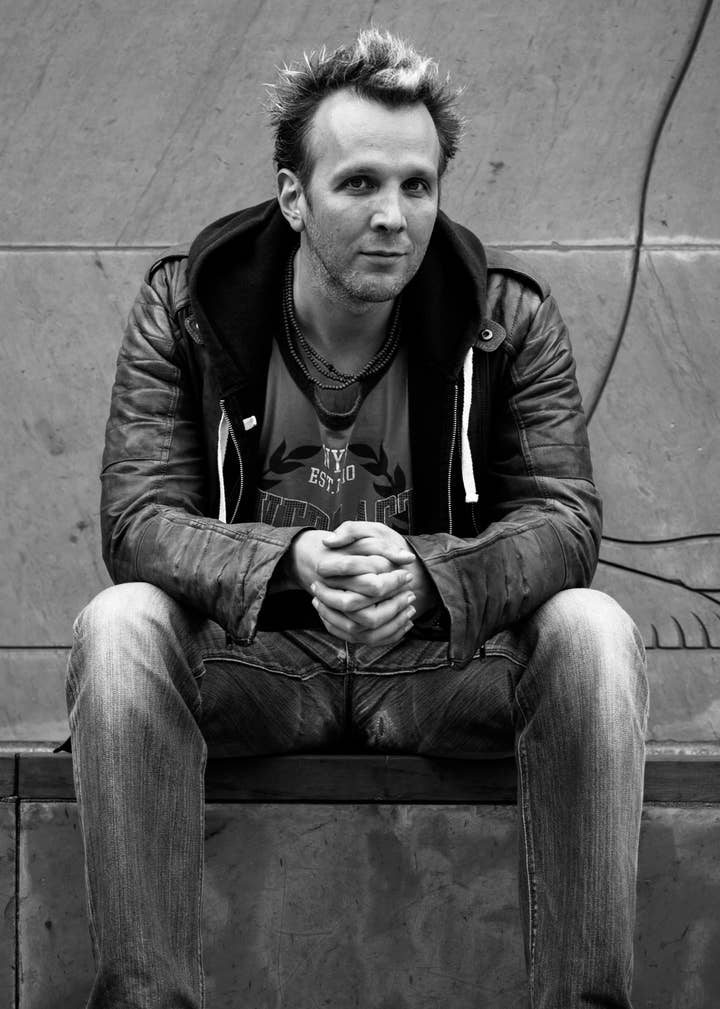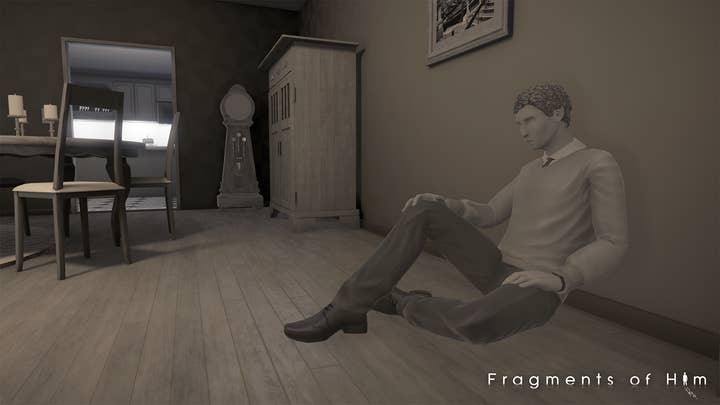Everyday bisexuality in video games
Fragments of Him developer Mata Haggis-Burridge on why non-hetero characters should be defined by more than sex
When reviews for indie title Fragments of Him emerged, there was a problem. The reception was warm enough and some critics praised the inclusion of a gay man as a lead character -- but that character, like the developer behind it, is actually bisexual.
In the credits, Mata Haggis-Burridge is listed as 'external consultant' for game and narrative design, but his role on Sassybot's first-person narrative adventure goes deeper. Fragments of Him tells the tale of Will and how his death in a tragic accident affects the loved ones he leaves behind. It's a fictionalised tale, of course, but the events, emotions, conversations and experiences are all heavily based directly on Haggis-Burridge's own life.
Which is why he was so surprised to see a "significant proportion" of the press coverage around his game mischaracterising Will as gay.

"We see him in this game dating a women, we see him dating a man, yes his final relationship is with a man, but that doesn't mean he stopped being bisexual," Haggis-Burridge tells GamesIndustry.biz. "I am married now, and I'm still bisexual. I certainly plan to be with that person for the rest of my life, but I am still bisexual because sexuality isn't about this performance of an act. It is about an identity."
The surprises kept coming - Haggis-Burridge even saw feedback from queer people claiming the writer knew nothing about queer lifestyles. The developer attributes this to a multitude of factors - not the least of which is the bisexual erasure seen in media, where bisexuality can be ignored, removed, oversimplified, dismissed as a performative act or even denied entirely.
"Ironically, by making a game about a true version of bisexuality, I shouldn't have been surprised that Will's bisexuality was erased and he was described as gay," says Haggis-Burridge. "I shouldn't have been surprised by that at all but it was a manifestation of the social issues going straight into the game.
"My version of bisexuality will not be everyone's version of bisexuality. It certainly didn't align with a few of the critics of Fragments of Him and their version of bisexuality. They go: 'I'm bi and I didn't even realise [Will] is'. Fair enough, okay, that's alright. It feels weird to me that his bisexuality was invisible but if it doesn't match other people's experience, I'm not going to tell them how to live their lives."
"Ironically, by making a game about a true version of bisexuality, I shouldn't have been surprised that Will's bisexuality was erased and he was described as gay"
He continues: "It was an incredibly hard game to create emotionally. I was opening up a lot of wounds, a lot of pain from people I have lost and channelling those memories into this script and this experience as best I could. To represent yourself as honestly and as openly as you can with that, that's a lot of emotional investment and effort and I struggled after that to reclose those boxes inside. Then to see people going: 'This person does not understand queer lives', you're like: 'No, that is my queer life'... I'm sorry it's not as flamboyant or as [flag-waving] but this is my everyday reality. So we see this bisexual erasure is a big thing and especially when a game is so personally entwined with yourself, that mischaracterisation of a character becomes a lot more personal as well."
Haggis-Burridge is a professor of creative and entertainment games at Breda University of Applied Sciences (formerly NHTV). Fragments of Him was built from a prototype he made with Sassybot's Elwin Verploegen and Tino van der Kraan, and was designed to demonstrate that bisexuality is about more than which gender you choose to date.
As Haggis-Burridge puts it, he wanted to build a game around an 'everyday' version of bisexuality. He deliberately avoids using the word 'inclusive' because it suggests "the people in power are choosing to let others come in". 'Normalised' is another word he steers clear of because it carries its own implications.
"It makes us, in the queer communities, sound like we're not normal -- but equally it is a normal word to show that we are and that step needs to be taken to get there," he says. "To have the rest of the world realise we are normal, that no, we're not straight, we're not always a binary gender, we're not always male or female, we can be genderqueer, we can be genderfluid, we can be agender... there are all kinds of different ways that gendered can be performed and sexuality doesn't always correspond with gender. The thing is this is normal for people who are within these groups. This is normal for us."

Haggis-Burridge and Sassybot were also keen to make something that depicts bisexuality in a deeper way than AAA games. Often the prime examples given are BioWare's Mass Effect and Dragon Age games, where players can develop relationships -- and eventually have sex with -- with characters of either gender. But, Haggis-Burridge stresses that this is purely "representation of bisexuality as a performance."
"You perform in a bisexual way by having sex with everybody," he says. "That's not how bisexuality feels for me. Bisexuality has been about finding people who I love and share a bond with and I'm just not that interested in their gender representation or the shape of their body."
"Pay people from the queer communities and people of colour to come in and help you be better. This is not rocket science. If it was rocket science, you'd hire a rocket scientist to work on your team"
When you take a closer look at Mass Effect, for example, the range of partners also doesn't seem particularly equal. In the first two games, male companions will only couple with female Shepard, while female characters will couple with male Shepard or (in some cases) female Shepard. This improves by the third game, where there are male partners for male Shepard but again the 'bisexual' companions are all female.
"That shows a level of discomfort about the representation of men not being straight in games, which is an issue," says Haggis-Burridge, adding that it also reflects a culture where bisexual and gay women are more accepted than bisexual and gay men.
As poor as non-heterosexual depiction in video games has been, the professor does observe that a lot of developers mean well and that he's "always had really positive experiences with the triple-A industries when we have these conversations".
"I know there is a lot of genuine good will from BioWare," he says. "As a company they are trying to do good things for representation. The triple-A industry is really trying hard. It doesn't necessarily always succeed -- and actually makes complete messes [sometimes] -- but there is good intention there. Although, intention doesn't score points in the end because it is about what you do.
"I think it is an issue that developers go: 'Okay, we want to have lots of gender inclusivity, so we'll make the character bi and then they can be whatever the player chooses'. That's not how bi works... In some respects, that's why Fragments of Him was non-flag-waving because I wanted to go: 'Here is the reality of being bi - you're not sleeping with everybody, it's not a mini-game, it's about loving people'. That's my version. I know some people who would only have a relationship with one gender, but they love having sex with more than one gender. Awesome, good for them. This is the point - there are different versions of this."
With so many different viewpoints on such an intangible aspect of life, any attempt to explore it through the medium of video games risks causing offence.. And regardless of how good the developers' intentions are, this needs to be dealt with sensitively as the age of social media is regularly demonstrating.
"We are afraid to talk about words that feel so big and powerful in games development, and we are afraid of getting it wrong"
"We can't say that it's the other person's choice to be offended," Haggis-Burridge explains. "We don't know their lives, we haven't lived through what they've been through. That might be the 5,000th time they've heard this so who are we to say, 'It's your choice to be offended'. Life can push people too hard sometimes. We can't always see where that's going to come from. We are blinkered in our lives. We all have our own privileges, we all have our own challenges and we have our own areas where we feel the world has been unfair to us. We can't see into the lives of other people very easily all the time and there will be things we miss."
There are ways to build your awareness as to what may potentially cause offence, of course. One suggestion the professor offers is simply following different people on Twitter, and thinking about why they are offended by certain things, rather than writing them off as another angry tweeter.
But for developers in the process of touching on these topics in their game, there's an even simpler solution.
"Just talk to the communities. Pay them. Pay people from the queer communities, pay people of colour to come in and help you be better, help you learn and hopefully work alongside you. Value them as equals on your team. This is not rocket science. If it was rocket science, you'd hire a rocket scientist to work on your team.
"And you know what - they're probably amazingly good game designers or producers or visual artists. They're already out there, they just want to work with you and make great things and be valued for the knowledge they bring because that diversity of knowledge helps your company, it helps your game improve.
"This isn't saying that every game needs to have a gay lead woman -- but having a few more wouldn't go amiss. We see an increase in women who are not straight in games, which is great. We don't see much representation of the transgender community in games. We don't see much representation of men who are not straight. We're seeing the representation of a patriarchal society and I think we are afraid to talk about words that feel so big and powerful in games development, and we are afraid of getting it wrong."
